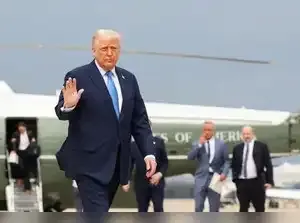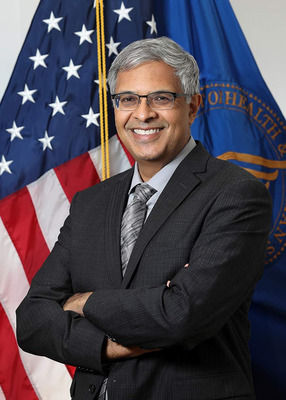As India and the world prepare for Liberation Day, U.S. President Donald Trump announced on Sunday that the reciprocal tariffs he plans to unveil this week will apply to all nations, not just a select group of 10 to 15 countries with the largest trade imbalances.
Trump has pledged to introduce a sweeping tariff plan on Wednesday, a move he has dubbed "Liberation Day." He has already imposed tariffs on aluminum, steel, and automobiles, alongside heightened duties on all imports from China.
"You'd start with all countries," Trump told reporters aboard Air Force One. "Essentially all of the countries that we're talking about." White House economics adviser Kevin Hassett recently told Fox Business that the administration’s tariff focus would be on 10 to 15 nations with the most significant trade imbalances, though he did not specify which ones.
Meanwhile, India is considering reducing or even eliminating customs duties on auto parts imported from the US, a government official told ET. The move comes as part of efforts to strengthen trade ties, with officials believing it would not significantly impact the domestic industry.
Trump views tariffs as a means of shielding the domestic economy from unfair global competition and as leverage for negotiating better trade terms for the U.S.
However, fears of a trade war are rattling markets, fueling concerns about a potential recession in the U.S.
The president has reiterated his commitment to imposing a set of reciprocal tariffs on nations that levy duties on U.S. exports, vowing to match those countries' tariffs.
Last week, Trump hinted that he might soften his approach, potentially setting tariff rates lower than what some countries currently impose on U.S. goods.
After imposing 25% auto tariffs last week, Trump claimed the U.S. has been unfairly treated due to its trade deficits.
“This is the beginning of Liberation Day in America,” he said. “We’re going to charge countries for doing business in our country and taking our jobs, taking our wealth, taking a lot of things that they’ve been taking over the years. They’ve taken so much out of our country, friend and foe. And, frankly, friend has been oftentimes much worse than foe.”
In an interview with NBC News on Saturday, Trump dismissed concerns that tariffs could drive up vehicle prices, arguing that higher costs on foreign cars would boost American-made vehicle sales.
“I hope they raise their prices, because if they do, people are gonna buy American-made cars,” Trump said. “I couldn’t care less because if the prices on foreign cars go up, they’re going to buy American cars.”
Trump has also indicated some flexibility in his tariff plans, suggesting that he will treat other nations better than they have treated the U.S. However, he has several additional tariffs in the pipeline.
His administration is set to tax imported pharmaceutical drugs, copper, and lumber while imposing a 25% tariff on any country importing oil from Venezuela—even though the U.S. does the same. Imports from China are now subject to a 20% tariff due to its role in fentanyl production. Additionally, Trump has placed separate tariffs on goods from Canada and Mexico, citing drug smuggling and illegal immigration. He has also expanded his 2018 steel and aluminum tariffs to 25% on all imports.
Some aides argue these tariffs are negotiation tools for trade and border security, while others believe the revenue will help reduce the federal budget deficit. Commerce Secretary Howard Lutnick has stated that the tariffs will compel other nations to show Trump “respect.”
Trump has pledged to introduce a sweeping tariff plan on Wednesday, a move he has dubbed "Liberation Day." He has already imposed tariffs on aluminum, steel, and automobiles, alongside heightened duties on all imports from China.
"You'd start with all countries," Trump told reporters aboard Air Force One. "Essentially all of the countries that we're talking about." White House economics adviser Kevin Hassett recently told Fox Business that the administration’s tariff focus would be on 10 to 15 nations with the most significant trade imbalances, though he did not specify which ones.
Meanwhile, India is considering reducing or even eliminating customs duties on auto parts imported from the US, a government official told ET. The move comes as part of efforts to strengthen trade ties, with officials believing it would not significantly impact the domestic industry.
Trump views tariffs as a means of shielding the domestic economy from unfair global competition and as leverage for negotiating better trade terms for the U.S.
However, fears of a trade war are rattling markets, fueling concerns about a potential recession in the U.S.
The president has reiterated his commitment to imposing a set of reciprocal tariffs on nations that levy duties on U.S. exports, vowing to match those countries' tariffs.
Last week, Trump hinted that he might soften his approach, potentially setting tariff rates lower than what some countries currently impose on U.S. goods.
What to Know About Trump’s Impending Trade Penalties
Trump plans to announce new import taxes, including “reciprocal” tariffs designed to match the rates charged by other countries while accounting for subsidies. Among the nations he has mentioned for potential taxation are the European Union, South Korea, Brazil, and India.After imposing 25% auto tariffs last week, Trump claimed the U.S. has been unfairly treated due to its trade deficits.
“This is the beginning of Liberation Day in America,” he said. “We’re going to charge countries for doing business in our country and taking our jobs, taking our wealth, taking a lot of things that they’ve been taking over the years. They’ve taken so much out of our country, friend and foe. And, frankly, friend has been oftentimes much worse than foe.”
In an interview with NBC News on Saturday, Trump dismissed concerns that tariffs could drive up vehicle prices, arguing that higher costs on foreign cars would boost American-made vehicle sales.
“I hope they raise their prices, because if they do, people are gonna buy American-made cars,” Trump said. “I couldn’t care less because if the prices on foreign cars go up, they’re going to buy American cars.”
Trump has also indicated some flexibility in his tariff plans, suggesting that he will treat other nations better than they have treated the U.S. However, he has several additional tariffs in the pipeline.
His administration is set to tax imported pharmaceutical drugs, copper, and lumber while imposing a 25% tariff on any country importing oil from Venezuela—even though the U.S. does the same. Imports from China are now subject to a 20% tariff due to its role in fentanyl production. Additionally, Trump has placed separate tariffs on goods from Canada and Mexico, citing drug smuggling and illegal immigration. He has also expanded his 2018 steel and aluminum tariffs to 25% on all imports.
Some aides argue these tariffs are negotiation tools for trade and border security, while others believe the revenue will help reduce the federal budget deficit. Commerce Secretary Howard Lutnick has stated that the tariffs will compel other nations to show Trump “respect.”








